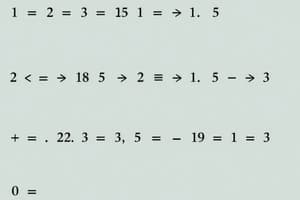Podcast
Questions and Answers
What is the EVM?
What is the EVM?
- A single computer operated by the Ethereum foundation
- A physical computer operated by all the nodes on the Ethereum network
- A cloud storage system for smart contracts
- A virtual machine operated by all the nodes on the Ethereum network (correct)
What language is commonly used to write smart contract code for the EVM?
What language is commonly used to write smart contract code for the EVM?
- C++
- Java
- Python
- Solidity (correct)
What is bytecode?
What is bytecode?
- A part specialized for computing numbers
- A list of operations named by their op code names
- A machine-readable language that the EVM reads and processes (correct)
- A human-readable code that gets compiled into Solidity
How is the cost of a smart contract determined?
How is the cost of a smart contract determined?
How are transactions submitted to the EVM processed?
How are transactions submitted to the EVM processed?
What is Solidity?
What is Solidity?
What is the EVM's role in DeFi?
What is the EVM's role in DeFi?
What unique pieces does the EVM need to read bytecode?
What unique pieces does the EVM need to read bytecode?
Flashcards are hidden until you start studying
Study Notes
Understanding the Ethereum Virtual Machine (EVM)
- The EVM is a virtual machine or a cloud computer that is operated by all the nodes contributing to it on the Ethereum network.
- The EVM is not a single computer but an accumulation of thousands of computers around the world.
- Each computer on the Ethereum network runs a piece of software that computes the output of smart contract transactions.
- Smart contract code written by developers is what the EVM processes, and the most common language used is Solidity.
- Solidity is human-readable code that gets compiled into bytecode, which the EVM reads and processes.
- The bytecode is a bunch of ones and zeros, which is a machine-readable language.
- Each smart contract can be broken down into a list of operations named by their op code names, and some op codes are more expensive than others.
- The total cost of a smart contract is determined by the work the EVM performs, whether it's reading or writing data, and how much data it reads or writes.
- Transactions submitted to the EVM are processed sequentially, one by one, and each transaction changes the state or the collection of data that the EVM holds.
- The EVM is easy to move between different chains if they both use the EVM, making it easy to move projects and applications from one chain to another.
- The EVM is a specialized computer designed to process DeFi transactions and is made up of parts similar to a real computer, such as memory storage and a part specialized for computing numbers.
- The EVM doesn't need a monitor, keyboard, or mouse, but it needs a part to understand and read smart contract code and a few unique pieces, such as a part to read bytecode.
Studying That Suits You
Use AI to generate personalized quizzes and flashcards to suit your learning preferences.




